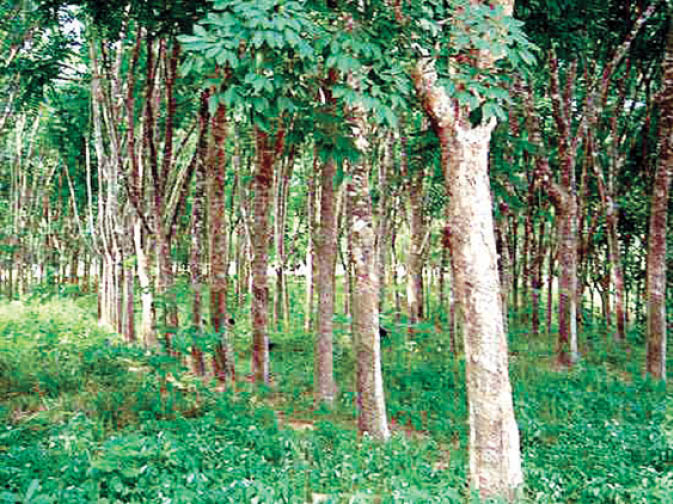Stakeholders who have been lamenting neglect of the rubber sub-sector hold a strong view that it can tremendously boost national economy if the Federal Government intervenes. One of them and President of the National Rubber Producers, Processors and Marketers Association of Nigeriaa (NARPPMAN), Mr. Peter Olowu Igbinosun, speaks on challenges and prospects of the sub-sector.
What are the challenges of the rubber industry in Nigeria?
They are so many. Majorly, it has to do with lack of a medium, long-term facilities and high cost of credit to finance private rubber plantations. There is also the high cost of inputs, labour and processing, mostly due to the current energy crisis – the uncontrolled hike in the prices of petroleum products. We can also add that poor exploitation practices are also our bane. Surviving rubber trees are exploited by untrained and greedy tappers by employing damaging tapping techniques such as slaughter tapping thereby resulting in the killing of rubber trees.
There is also the long gestation period of five to seven years for rubber; which serves as a disincentive to smallholder farmers and investors.
Obtaining short and low interest loans from the banks for the crop most times is a mirage.
There is also difficulty in accessing land for cultivation because of the land tenure system.
Are these the only reasons Nigeria is not making appreciable impact in rubber business?
Our impact in global rubber production has declined over the years. Reasons for the decline are many; which we will like the Federal Government to address to enable Nigeria take up the leading role. There is the poor implementation of government policies. Government introduced several support programmes that ended abruptly. Notable among these was the Presidential Initiative on Rubber (PIR), which had a support plan of over a decade, but was supported for only a year.
The second is the age of many rubber plantations. Many of them were established over 30 years ago and have gone past their economic thresholds. Re-planting of some of these farms has been difficult because of poor management and funding.
There is also weak extension service delivery. It is non-existent. Rubber production is highly technical; from nursery production, plantation establishment, maintenance, exploitation, processing to marketing. Farmers and stakeholders also need training and re-training.
You spoke about difficulty in land acquisition. Could you expatiate on that?
State and local governments should facilitate land acquisition processes for new developments and expansion at favourable conditions for rapid plantation development. There should be a conducive environment such that smallholder farmers will also have easy access to funds both as individuals and as farm clusters at favourable terms.
Development of agricultural insurance framework should be in place to mitigate losses during natural disasters. I must stress that this is a serious concern in the rubber industry. I also advise that government should set up a price regulatory body, as well as a quality control apparatus.
What are the potentials of natural rubber?
Natural rubber production is considered one of the most profitable agro-industrial ventures. Rubber is rated the world’s fourth most important natural resource after air, water and petroleum.
If the rubber industry is well re-positioned, this capital and labour-intensive industry has the capacity to create wealth, enhance the non-oil sector forex earnings and can also greatly reduce crime and militancy. There is an array of other benefits from natural rubber.
Planting rubber trees generate carbon pits and fit with the Clean Development Mechanism (CDM) of the Kyoto Protocol.
Rubber, as an internationally traded agricultural commodity that is in high demand all over the world plays a major role as a forex earner and is a major contributor to the growth of our national economy. Natural rubber is a strategic material as it cannot be replaced in many important applications due to its outstanding elasticity, resilience, flexibility at low temperatures, resistance to abrasion, impact and corrosion, facile adhesion to textile and steel and to its impermeability, insulating properties and ability to disperse heat.
There are over 50 byproducts of rubber cutting across all major sectors of the economy. These include natural rubber latex products such as adhesives, mattresses, pillows, seat cushions, car seats, baby feeding bottle teats, condoms, surgical, domestic and industrial gloves, balloons, balls, rain boots, rubber bands, catheters, carpet underlay, paints, Liquefied Natural Rubber, among others.
How many states in Nigeria cultivate rubber?
In Nigeria, rubber plantations are found in 24 states. They are mostly in the southern states such as Edo, Delta, Cross River, Akwa Ibom, Bayelsa, Rivers, Lagos, Ogun, Ondo, Osun, Ekiti, Oyo, Imo, Abia, Ebonyi, Anambra and Enugu. These states lie within the tropical rainforest belt with an estimated 18 million hectares. In the North, we have Taraba, Benue, Kaduna, Adamawa, Kwara and Niger states.
How can rubber help reduce unemployment in Nigeria?
It will interest you to know that our association is at the verge of commencing massive planting of 160,000 hectares of rubber plantations in 24 states in Nigeria for the next 10 years. Most of these states are in the South South, Middle Belt and the North East. This project will employ 640,000 people directly and 160,000 people indirectly. This is an example of how rubber can provide massive employment in Nigeria.
Today, we have about 200,000 hectares of rubber plantations in Nigeria (smallholder and industrial plantations). The rubber industry alone (plantations and factories) has employed over 800,000 people; it is a goldmine.
What is the place of rubber in today’s economy, vis-à-vis COVID-19?
It will not be out of place to say unequivocally that it would have been difficult to fight COVID-19 around the world without the use of rubber by-products. In Nigeria, for example, the first complaint by medical personnel is lack of or insufficient Personal Protective Equipment (PPE) in the fight against COVID-19 in order not to get infected. The medical and surgical disposable hand gloves, the rain boots, the coverall, some components of goggles, etc. are all byproducts of rubber.
Furthermore, hospital mattresses, pillows and seat cushions used by medical personnel in the fight against COVID-19 are from rubber.




